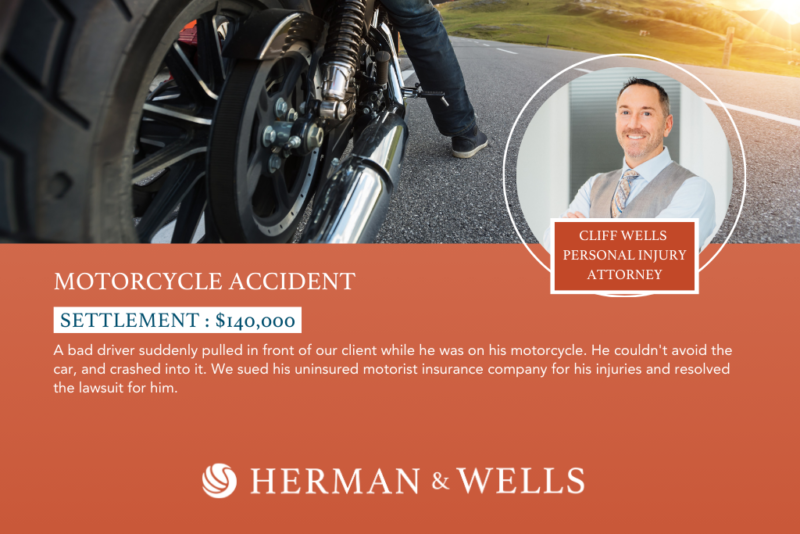Imagine the thrill of cruising Florida’s picturesque coastline on your motorcycle, the wind in your hair, and the open road ahead. But with this exhilaration comes responsibility. Florida’s roads, though scenic, can be unforgiving, and a motorcycle accident can have life-altering consequences.
In this post, we’ll share five essential motorcycle safety tips to ensure you stay safe on the road. And remember, if you ever find yourself in the unfortunate aftermath of a motorcycle accident, our experienced attorneys at Herman and Wells are here to guide you and uphold your rights. Don’t hesitate to reach out for the support and legal expertise you need at (727) 821-3195.

Navigating Florida’s roads on a motorcycle brings a unique set of challenges and risks. The state’s bustling urban areas, combined with tourist traffic and frequent weather changes, create conditions that can be hazardous for motorcyclists. Awareness of these risks is the first step in ensuring a safer riding experience, helping you to prepare and respond effectively to the unpredictable nature of the road.
Motorcycle accidents in Florida can often be traced back to a few common factors. Understanding these can be pivotal in reducing the risk of accidents.
Motorcycles are smaller and less visible compared to other vehicles, making them more susceptible to being overlooked by other drivers. This problem is exacerbated in heavy traffic or during inclement weather, increasing the likelihood of accidents.
Potholes, wet surfaces, and uneven roads pose a significant threat to motorcyclists. These hazards, which might be minor annoyances to cars, can lead to serious accidents for motorcycles due to their less stable nature and smaller size.
High speeds and reckless driving behaviors significantly raise the risk of collisions. This applies to both motorcyclists and other vehicle drivers. Excessive speed reduces reaction time and increases the severity of an accident should it occur.
Let’s dive into the five essential safety tips that every rider should know and practice.
One of the most straightforward yet impactful ways to prevent motorcycle accidents is by strictly adhering to Florida’s traffic laws. These laws are designed not only to regulate traffic flow but also to ensure the safety of all road users, including motorcyclists. Respecting speed limits, signal rules, and lane usage is essential for a safe riding experience.
Following traffic rules is crucial as it creates predictability on the road, which is key to avoiding accidents. When all road users, including motorcyclists, adhere to the established rules, it reduces the chances of unexpected maneuvers that often lead to collisions. By staying within the legal boundaries of traffic laws, motorcyclists can significantly enhance their safety and that of others on the road.
Florida has specific traffic laws tailored for motorcyclists, aimed at ensuring their safety and compliance on the road. These include mandatory helmet usage for riders under 21 and optional for those over 21 with adequate medical benefits insurance.
Equipping yourself with the right safety gear is a critical step in preventing motorcycle accidents and minimizing injuries should one occur. This includes wearing a DOT-approved helmet, regardless of age, to protect your head during an impact.
Additionally, wearing protective clothing such as a jacket, gloves, pants, and boots can significantly reduce the risk of severe injuries. These gear pieces are designed not only for comfort and style but, more importantly, for safety, providing crucial protection against the elements, road debris, and impacts.
Proper safety gear plays a vital role in preventing serious injuries. A helmet can greatly reduce the risk of traumatic brain injuries, while padded jackets and pants protect against severe abrasions and broken bones. Gloves and boots are crucial for protecting hands and feet, which are particularly vulnerable in accidents.
Regular maintenance of your motorcycle is crucial for ensuring a safe and reliable ride. Keeping up with scheduled services, such as oil changes, brake inspections, and tire checks, can prevent mechanical failures that might lead to accidents. A well-maintained motorcycle not only performs better but also provides the rider with confidence and control, which are key in avoiding hazardous situations on the road.
Enhancing visibility is a key factor in preventing motorcycle accidents, especially in a state like Florida with high traffic density. Being easily seen by other drivers can significantly reduce the risk of collisions.
To ensure you’re seen by other drivers, use bright and reflective clothing and gear. Ensure your motorcycle’s lights are functioning correctly and consider using additional lights or reflective tapes on your bike. Always position yourself in the lane where you are most visible to other drivers, and avoid riding in blind spots. Making eye contact with drivers at intersections can also help in ensuring they have seen you. Remember, the more visible you are, the safer your ride will be.
Defensive riding is essential for motorcycle riders in Florida, where road conditions and traffic can be unpredictable.
Mastering defensive riding skills involves being alert, maintaining a safe distance from other vehicles, and anticipating the actions of other drivers. It’s important to practice safe lane positioning, use mirrors effectively, and be prepared to react quickly to unexpected situations. Continuously scanning the road for potential hazards and having an escape route in mind can make a significant difference in your safety.
Anticipating hazards is about being aware of common dangers on Florida roads, such as sudden stops in traffic, vehicles changing lanes without signaling, and pedestrians crossing unexpectedly. Weather conditions in Florida can also change rapidly, so it’s important to be prepared for wet roads and reduced visibility. By staying vigilant and expecting the unexpected, you can navigate these hazards more safely.

Florida’s weather patterns, characterized by sudden rainfalls and intense storms, can drastically alter road conditions. This sudden change can lead to slippery roads and reduced visibility, posing significant challenges for motorcyclists. It’s crucial for riders to understand how these weather conditions affect road safety and to adjust their riding style accordingly.
Adapting to Florida’s weather conditions means being prepared for sudden downpours and wet roads. This includes having appropriate rain gear, ensuring your motorcycle’s tires have good tread for wet conditions, and using anti-fog visors to maintain clear visibility. Adjusting your speed and increasing following distances during adverse weather conditions are also key strategies for safe riding in Florida’s unpredictable climate.
When navigating Florida’s weather, motorcyclists should:

In Florida, there are several motorcycle training courses available that are designed to enhance safety and accident prevention skills for riders. The Florida Rider Training Program (FRTP) offers courses developed by the Motorcycle Safety Foundation (MSF). These courses include the Basic RiderCourse® (BRC) and the updated Basic RiderCourse® (BRCu), which are essential for new riders to develop fundamental motorcycling skills. These courses cover a wide range of topics, from basic control and operation of a motorcycle to advanced skills like quick stopping, cornering, and swerving.
Additionally, the FRTP provides specialized courses such as the 3-Wheel Basic RiderCourse® for three-wheel motorcycles and the Sidecar/Trike Education Program. These are particularly useful for riders interested in operating three-wheel motorcycles or motorcycles with a sidecar.
Ride Smart Florida also offers advanced motorcycle training courses. These courses are designed to help riders practice crash-avoidance techniques and enhance their overall riding experience. They include periodic training sessions which allow riders to re-evaluate and refresh their riding skills, receive guidance on adapted riding techniques, and renew confidence on the road.
The importance of these training courses lies in their ability to equip riders with the necessary skills to manage their riding environment and avoid crashes. Completing such training is not only a matter of compliance with Florida’s laws for obtaining a motorcycle endorsement but also a crucial step in becoming a safer, more responsible rider.
For more information and to find a course near you, you can visit the Florida Rider Training Program website and the Ride Smart Florida website.
Riding a motorcycle in Florida can be an exhilarating experience, but it also comes with its share of risks. Even the most careful riders can find themselves in unforeseen situations. If you or a loved one has been injured in a motorcycle accident in Florida, it’s important to know that you have support and legal options.
Don’t let the aftermath of a motorcycle accident overwhelm you. Our experienced team is here to offer guidance, support, and the legal expertise you need during this challenging time. Contact Herman and Wells today for an evaluation and let us help you on your road to recovery, (727) 821-3195.